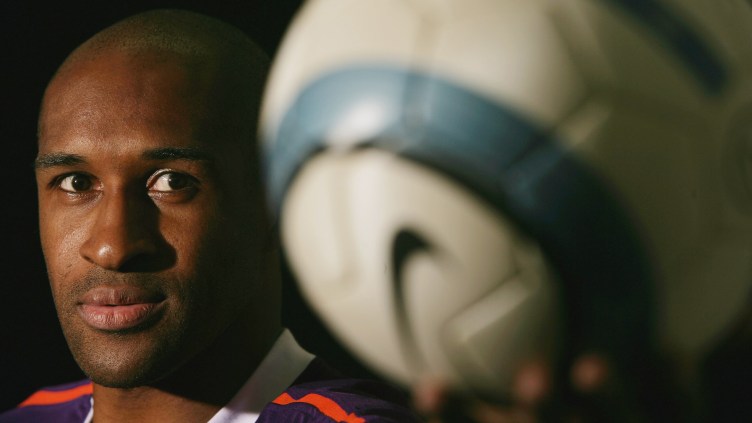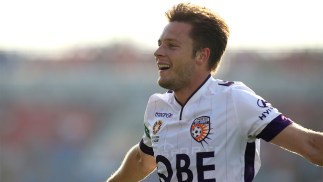As new dawns go, the creation of the A-League proved to be anything but a bright one for Perth Glory.
The final years of the National Soccer League had seen the WA club reach four Grand Finals and win two titles, establishing itself as a national football powerhouse in the process.
But with a financially-level playing field enshrined as one of the key components of the newly-created A-League competition, the country’s football landscape changed dramatically.
The inaugural 2005-06 season was destined to end in disappointment as coach Steve McMahon departed midway through and the club ultimately missed out on the four-team finals by two points.
Glory’s travails during that campaign were, in many ways, personified by marquee signing Brian Deane who made only seven appearances and scored just once, ironically in what proved to be his final game for the club,
And for the man who found the net nearly 200 times for the likes of Sheffield United, Leeds United, Middlesbrough, Leicester City and Benfica, that lack of success here in the west still rankles.
“I was gutted,” he said, “because there weren’t too many situations in my career where I came away not having been successful.
“It’s quite sad for me.
“It was just unfortunate that when I went to Perth, I hadn’t had the opportunity to prepare properly.
“I also didn’t have all the information that would have given me a better chance to understand and prepare for what I was in for.
“For me, it looked like it was going to be a fantastic opportunity, but unfortunately it didn’t work out that way.
“For the fans looking at it, they’d probably read about me being the first player to score in the Premier League and doing things at Leeds, Sheffield United, Leicester and West Ham and maybe they thought that that was the player they were getting.
“But the Brian Deane who came to Perth aged 37 was very different to the Brian Deane who had played for Leicester in the Premier League a couple of seasons earlier.
“In reality, mistakes were made on both sides.
“I don’t regret going there, though.
“The city was fantastic, I loved it and given time to prepare properly, it might have been a different scenario.”
Deane had clearly been determined to try and make the move work despite it being something of a step into the unknown for him.
And the additional pressure of being the club’s marquee signing certainly did not faze the man with three senior England caps to his name.
“I got a call from an agent who told me about the new league starting up in Australia,” he recalled.
“I’d played abroad already in Portugal with Benfica and I was keen to try something different rather than sign for another club in England.
“And the idea of being involved in the inception of the A-League also appealed to me.
“I didn’t know much about the level of the football to be honest.
“But I knew Dwight Yorke was going to be out there and that there was this thing about marquee players.
“In terms of expectation, I’d played with that all my life.
“Benfica are one of the biggest clubs in Europe and there is huge expectation when you are playing in front of 70,000 people.
“But that was something that I could handle at the time because I was very much in control of all my faculties.
“So it was a bit frustrating to come over to Perth and find that it was going to be tougher to establish myself and that people wouldn’t see the best of me.
“I didn’t help myself in some ways because when I came over, I hadn’t done a pre-season.
“I came over and got thrust straight into games and it was hard because as you get older, you have to prepare yourself more for games and in particular, a succession of games.
“It took me a while to get up to speed with all that.
“Also, at that point in my career, I was reliant on my experience in the box.
“We had a very tricky winger called Hiro (Hiroyuki Ishida).
“He was very good one-on-one, but very often the ball didn’t end up coming into the box.
“It was difficult being a standing target.
“Having been a manager myself now, I understand that if you are bringing players in, you have to have a support network in place to make sure that things go well.
“I was still in pretty good shape, but in terms of my mobility, I had changed as an athlete and as a footballer.
“I couldn’t chase into channels anymore, it was more about the ball being played in to me and then support getting to me pretty quickly.
“All these were considerations that maybe weren’t thought out.
“I’m not making excuses; I’m just explaining why it was difficult for me to settle.”

Like his marquee signing, Glory boss Steve McMahon also found it tough going, with his abrasive manner swiftly alienating a large swathe of the WA sports media.
Deane, however, has a degree of sympathy for his fellow-Englishman.
“He was all right,” he said.
“I’ve worked under some very experienced managers in very different circumstances, so it’s probably unfair to judge what Steve was doing at the time.
“It was all new for him as well in terms of the resources available and so on.
“It was a very difficult situation, he was getting to know players and maybe he didn’t really understand the culture of football in Australia and the issues that the game was up against in terms of cricket and AFL and so on.
“When you move to another country, you have to take all those things into account.”
One of the sticks used to beat McMahon was his decision to sign his son, Steve Jnr, whose indifferent form in midfield prompted allegations of nepotism.
So as a fellow member of the playing group, what did Deane make of it all?
“If you go into a situation like that at as a coach and make that call, you have to live and die by that decision,” he said.
“If you’re bringing someone in, you have to be able to look at it objectively and decide whether he is good enough to do the job.
“If he is and you’re confident about it, then do it.
“Steve Bruce did it with his son, Alex, and Sir Alex Ferguson had his son Darren at United, so it does happen.
“Perhaps one of the issues was that here was a foreign coach bringing in his son and could that place have gone instead to a local lad?
“But to be honest, it wasn’t something that I could afford to spend too much time thinking about at the time.”
15 games into the season, McMahon’s turbulent reign was over, but Deane’s similarly ill-fated Glory stint had already come to an end by then.
The Round 9 home win over Melbourne Victory proved to be his final appearance in the famous purple as he took the decision to head home early.
“At that age you start to pick up niggling injuries,” he said, “and I felt that it would be better for me to free up the space and some of the budget and allow the team to move on.
“I went back to Sheffield United and finished the season with them and the first thing they did was to put me on a program to get fit.
“They didn’t even consider picking me for six weeks.”
But although his Australian adventure had ultimately proved underwhelming, Deane clearly never lost his appetite for an overseas challenge, opting to start his fledgling managerial career in 2012 by taking charge of Norwegian side Sarpsborg.
“Norway was fantastic and I really enjoyed it,” he said.
“The team that I took over in Norway had just gone up to the top division and I managed to keep them up in the first season and we finished eighth in the second.
“Sometimes you have to go out of your comfort zone and test yourself and I did that by going to Norway.
“When I came back, I was a bit disappointed that I was overlooked for certain positions.
“But you’ve got to keep your chin up and keep going until something turns up.”
So what does the future hold for the likeable Yorkshireman who will turn 49 in February?
“At the moment I do some coaching, but not at the level I want to be at,” he said, “and I do some sports consulting and some work with agents.
“I’m basically keeping my hat in the ring.
“I came back to England from Norway because I wanted to put roots down in terms of the management side of things.
“But the industry is incredibly competitive here and there are some very good managers and coaches out of work.
“The bottom line is that the feeling you get from managing is the next best thing to the feeling you get when you’re playing.”




